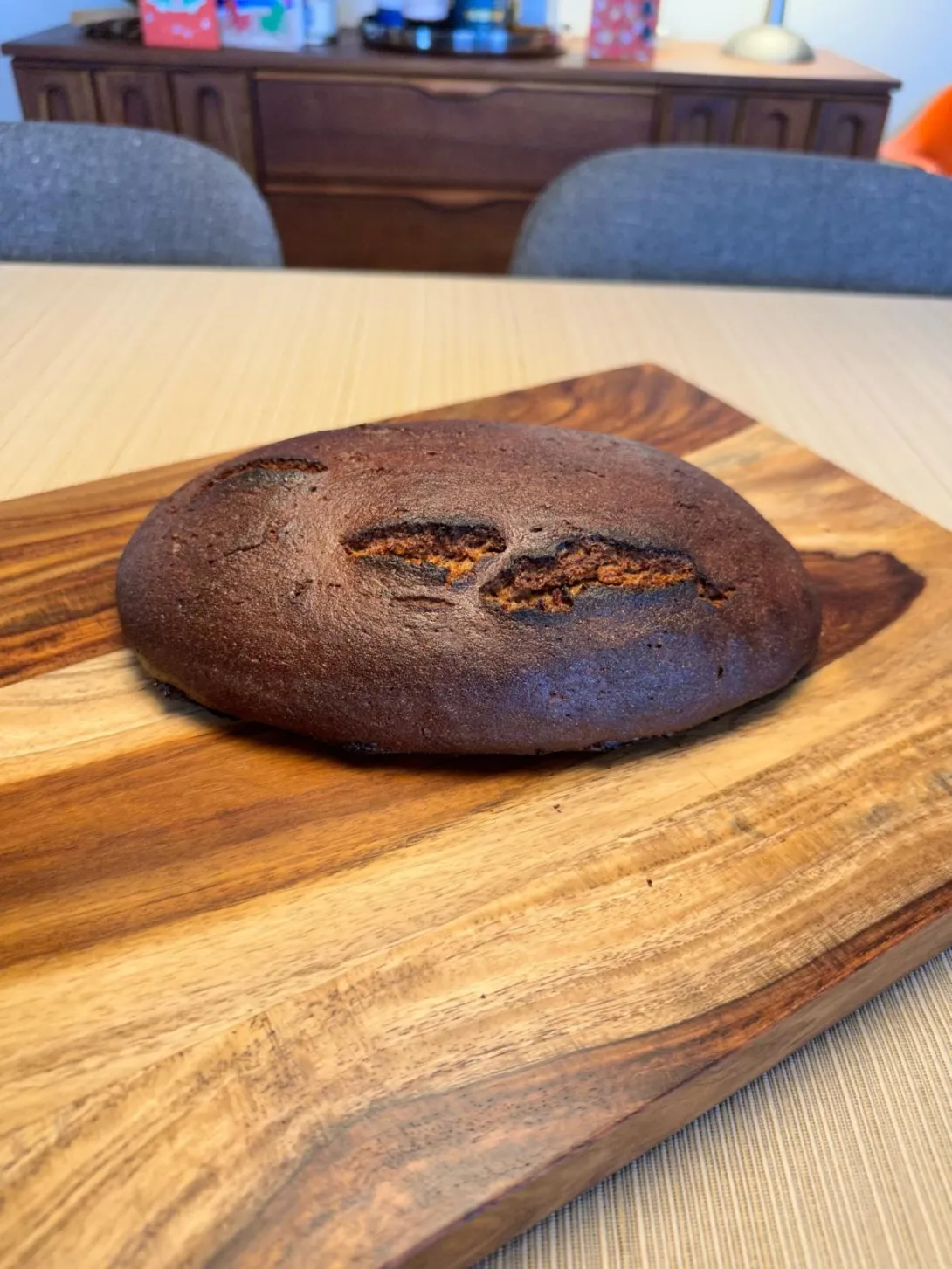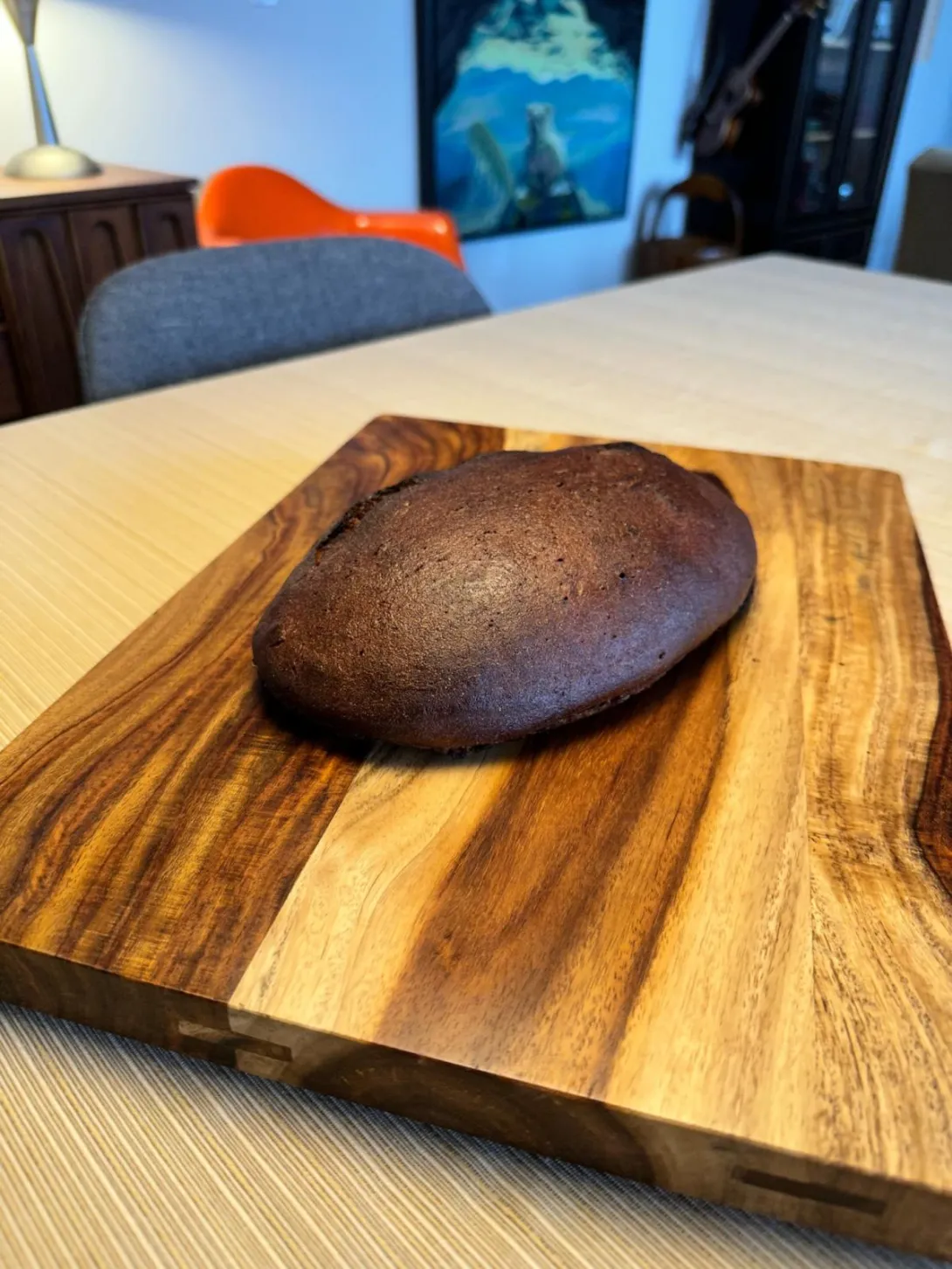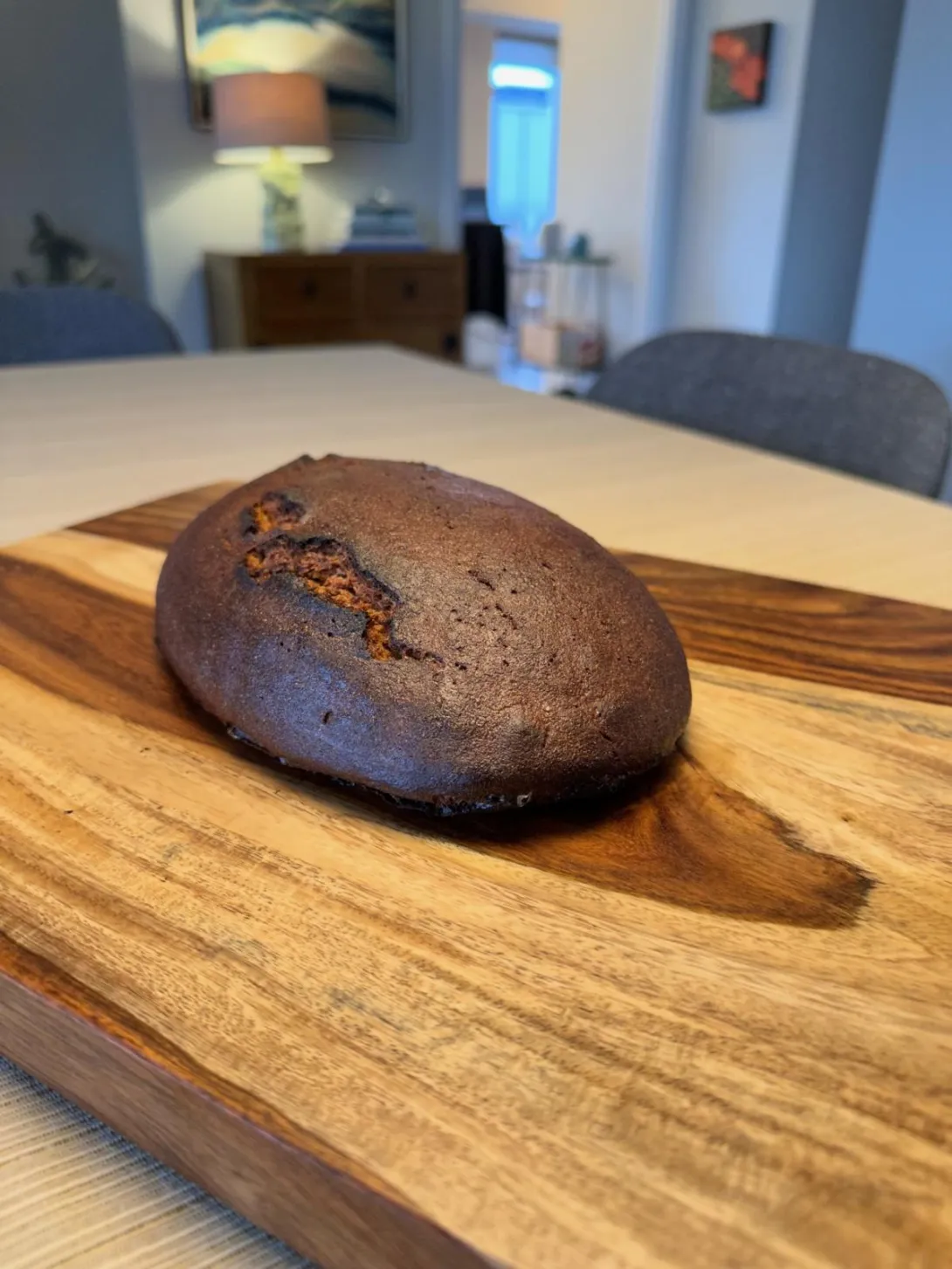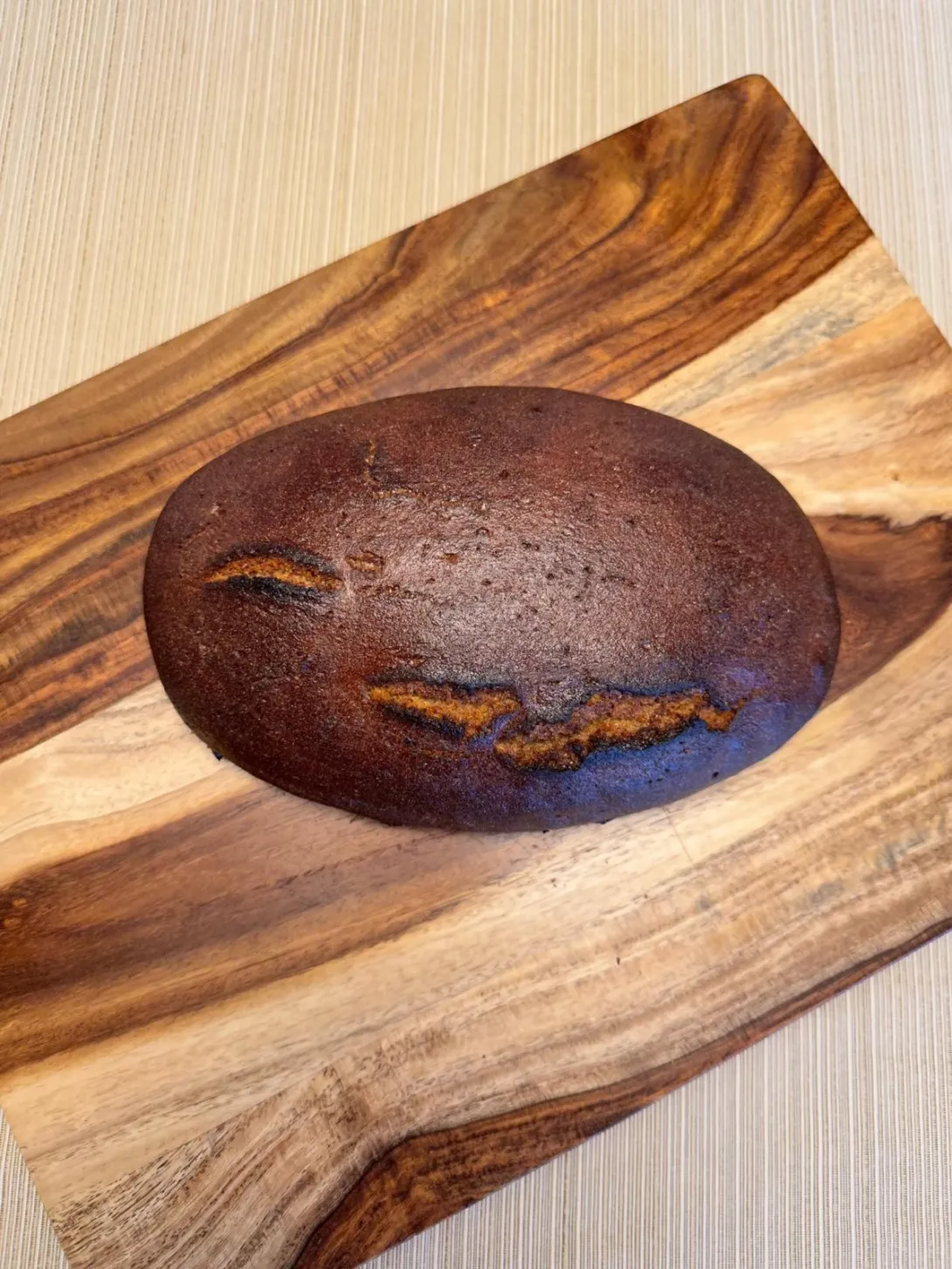My first time trying this bake which Lance, Jeff, Martadella and Rob have been posting about. Not being sure if I would like it or not since I haven’t like many of the previous 100% ryes breads I’ve baked, I decided to make a half sized loaf. I also bought a fresh bag of Anita’s organic whole rye flour to ensure that the rye I used wasn’t starting to go off and alter the flavour. The cracking appears to show a bit of under proofing, I did 50 mins of final proof but the dough was showing a good number of broken bubbles but not cracks at that point so I decided to bake it. I like the rustic appearance of the cracks and it shouldn’t affect the flavour, but may make the crumb a bit more dense, hopefully not too much.
I’ve made notes in Stanley Ginsberg’s original post with some of the things that Martadella or Lance changed.




http://theryebaker.com/latgalian-rye/
Highly recommended.
Can use barley diastatic malt instead of pale rye malt.
Hold the scald at 65°C for 3 hours.
Hold Sour-scald at 28-32°C
Rye %: | 100% |
Stages: | Sponge, Scald, 2-Stage sponge-scald |
Leaven: | Rye sour culture, Instant yeast |
Start to Finish: | 28-32 hours |
Hands-on Time: | 45-50 minutes |
Yield: | One 3.15 lb/1.40 kg loa |
Scald (Day 1, Evening):
Ingredient | Grams / ½ batch | Ounces | Baker’s |
320 / 160 | 11.30 | 100% | |
Hot (150°F/65°C) water | 650 / 325 | 22.95 | 203% |
20 / 10 | 0.70 | 6% | |
Caraway seed, ground | 2 / 1 | 0.05 | 1% |
Can use Diastatic Barley Malt instead of pale rye malt.
In the mixer bowl, mix the scald ingredients by hand into a firm porridge, cover and let stand at 150°F/65°C until it smells like apples, has a sweet taste and the consistency of pancake batter, 16-18 hours. (Original instruction)
Instead hold the scald at 65°C 150°F for 3 hours. Could also use the instant pot [keep warm normal] 148°F.
Sponge (Day 1, Evening): (Stiff levain)
Ingredient | Grams / ½ batch | Ounces | Baker’s |
50 / 25 | 1.75 | 100% | |
Warm (105°F/41°C) water | 30 / 15 | 1.05 | 60% |
Rye sour culture | 20 / 10 | 0.70 | 40 |
Mix the sponge ingredients by hand into a stiff dough, cover and ferment at room temperature (70°F/21°C) overnight, 16-18 hours, until the sponge has visibly expanded and has a pronounced vinegar smell.
Sour-Scald 1 (Day 2, Noon)
Ingredient | Grams / ½ batch | Ounces | Baker’s |
Sponge all | 100 / 50 | 3.55 | 100% |
Scald all | 992 / 496 | 35.00 | 992% |
Combine the sponge and scald, cover and let stand at 130°F/55°C until it has a strong smell of apple cider, 6-7 hours.
Martadella did the following: At 28-32°C 82-90°F
Drop sour into scald, dont mix, leave in a warm place for 3 hours
(I did 2 hours)
Then mix and let stand in warm place another 3 hours
(I mixed after 2 hours and removed from lukewarm oven, placed at cool room temperature overnight)
Sour-Scald 2 (Day 2, Afternoon)
Ingredient | Grams / ½ batch | Ounces | Baker’s |
Sour-Scald 1 all | 1092 / 546 | 38.50 | 100% |
Instant yeast, ¼ tsp | 1 / 0.5 | 0.05 | 0.01% |
Add the instant yeast to Opara 1, stir to blend, cover and ferment overnight, 10-12 hours, at room temperature. In the morning, the mixture will be extremely bubbly and have a distinctive sweet-sour taste.
Martadella - dissolve the yeast in a small amount of water, then add to the sour-scald 1 1. ferment 12-13 h at 28-30°C 82-86°F
(He actually added 2g yeast and fermented 8 hours)
Final Dough (Day 3, Morning):
Ingredient | Grams / ½ batch | Ounces |
Sponge-Scald 2 all | 1093 / 546.5 | 38.55 |
600 / 300 | 21.15 | |
Water | 100 / 50 | 3.55 |
Salt | 5 / 2.5 | 0.20 |
Honey | 30 / 15 | 1.05 |
Add the final dough ingredients to the Opara 2 and use the dough hook at low (KA2) speed to mix until the dough is fully blended into a firm, sticky mass that gathers around the hook, 7-8 minutes.
Turn the dough onto a well-floured work surface and used floured hands to shape it into an oblong loaf, then place it on a well-floured peel, if using a baking stone, or on a parchment-lined sheet pan.
I wet the counter and my hands to shape. Try to shape very narrow since the dough will spread as it final proofs.
Alternatively - Martadella - kept the countertop wet and used wet hands to shape.
Final proof was 60 mins for him.
Brush the loaf with water, cover it with a tea towel and proof at room temperature, brushing with water every 15 minutes, until it has expanded to about 1 ½ times its original volume and shows cracks and broken bubbles, 45-50 minutes.
I used a spray bottle to keep the dough damp.
Preheat the oven to 480°F/250°C with the baking surface in the upper third. Brush the loaf with water and bake without steam for 40-45 minutes, then reduce the temperature to 390°F/200°C and continue to bake until the loaves thump when tapped with a finger and the internal temperature is at least 200°F/93°C, about 20 minutes more.
Everyone commented that these temperatures were too high.
Start 480°F 30 mins then drop to 400°F until done another 15-30 mins or so. Apply cornstarch glaze and then return to oven until glaze sets, about 3-4 mins.
Glaze:
Ingredient | Grams / ½ batch | Ounces |
Cornstarch or potato starch, 1 tsp | 3 / 1.5 | 0.10 |
Water, 1 cup | 227 / 113.5 | 8.00 |
Bring about three-fourths of the water to a boil. Dissolve the starch in the remaining 1/4 of the water water and add it to the boiling water, stirring constantly until the mixture thickens. Brush the hot glaze on the top crust and return the loaf to the oven until the glaze sets, 3-4 minutes. Transfer to a rack and cool thoroughly before slicing.
- Benito's Blog
- Log in or register to post comments
I will wait until tomorrow to slice this open. A question for you rye bakers, once this has cooled, do you wrap in cling wrap or just put it in a bread bag for 24-48 hours?
Thank you Martadella, Lance and Rob for you posts about this bread.
Benny
And you too, wow! I am just planning to try my hand at this when I am back from holidays, if I manage with the scheduling, this type of bread takes a long time and is not very forgiving with the timing.
Looks amazing, and cracking is a very common problem for free-form rye bread :)
I never wrap this kind of bread, or any other bread, in anything, there is no need. All my bread I just keep outside cut site down on the cutting board. The only exception is if I want the crust to become soft, but after a cornstarch glaze it should soften anyway.
Thank you Ilya, The crust doesn’t feel too hard, so I’ll just place it in my flax bread bag and try to be patient until tomorrow to slice it. 🤞 that we actually like it.
I have read that the Ankarsrum Assistent works really well with rye breads. Considering that it is from Sweden that isn’t surprising. The Ank did a great job mixing this dough, it came together super fast, so easy.
Great, it does seem like the design of the Ank should work perfectly for mixing rye dough. Wish I had one!
Hope you like the bread, looking forward to your tasting notes :)
Hi,
I need to try out a heavy duty mixer soon on heavy dough. It is an inherited old heavy mochi maker with a knead function.
I see that in
https://www.thefreshloaf.com/node/71685/latgalian-ryelatgalie%C5%A1u-maize-latvia-stanley-ginsberg-rye-baker
you mixed 7-8 min with KA. Would you recommend this time at that stage?
It is a challenge even attempting these long processes!
I actually no longer have my KA mixer and used my Ankarsrum Assistent. However, yes the mixing time was still about 7-8 mins.
Cool that you have a mochi mixer, I’ve never seen one. Have you made mochi with it?
Benny
Hi,
My mother-in-law made it numerous times for us. It was plain or filled with red bean paste.
The sweet rice has no sugar in it since freshly cooked sweet rice (grain form) is "pounded" through the kneading action of the machine. The new mochi / kneading machines from Japan can do the same I think. What is on the board for this week's bake?!
Here is a picture:
Well if that can beat mochi then it can knead any stiff dough whatsoever. I look forward to whatever you bake using it. This week I’ll need to make rolls again for another dinner party, I’m thinking cheesy rolls which I’ve never done before. Love trying different things. What will your next bake be?
Benny
Hi,
Yesterday I tried rus brot's 100% whole wheat with liquid yeast (#7)
I like doing the process (half as long as yours above) but I think with freshly ground grains
it was too dry --- so hydration was 73% from 63% (maybe 68-69 would have been better).
Notes- dense on the bottom; flavor, fragrance and spiciness -very good. Will have to keep trying on this one, time permitting!
Hi Benny,
I put a nice batch of heavy rye dough into the mochi mixer but the bottom mechanical piece just rotated and carved out a small space in the dough and nothing moved. :( I think the dough is very viscous. Though I don't need it for a regular wheat dough, I want to see if that dough will be kneaded like in the Zojirushi.
Sorry to hear that the mochi mixer didn’t work on the rye dough, that is too bad.
Benny
Hi,
Would you be able to tell us what this word "opara" means? I thought it was google translate's best guess for the original word.
Thanks!
Opara means preferment.
Fantastic, Benny! Even the cracks look super! I'm eagerly awaiting your reaction once you slice into it!
Rob
Thank you Rob, your excellent bakes really encouraged me to try this bread. Hoping that we’ll like it, the process is interesting and different from what I’m used to doing.
Benny
Looks really nice Benny. I'm looking forward to tasting notes and crumb photos.
Tony
Thank you Tony, I hope we enjoy this bread, it was a fun process overall. Using the Ankarsrum Assistent to mix it made it seem like it was made for this style of dough.
Benny
Looking good, Benny! I'll be interested to read your impression of this bread.
Thanks for such a detailed write-up. That will help any future adventuresome rye bakers tackle this recipe.
Thank you Jeff, thanks for the post that you did on your bread which by the way was so perfect, no underproofing like mine. Your post and its tips really helped with mine.
Benny
Looks great Benny. The cracks add a little character to the loaf!
Look forward to hearing if you like this one. Keeping 🤞too.
Thank you Troy, I will slice some of it for lunch, I hope I like it too. The scald smelt so aromatic with the sweetness of the sugars released by the amylase and the caraway, it was quite unexpected.
Happy New Year Troy.
Benny
Benny, that crumb looks perfect! Not under-proofed at all. I think it is a characteristic of these breads to have a squat profile, based on pictures I have seen on the Russian blogs.
That’s kind of you to say Jeff, thank you. You were certainly able to achieve a much better profiled and fully proofed bread, so impressive. Thanks again for the encouragement to try this, it is so different from my usual bakes, it was a great learning experience.
Benny
Despite your concerns about the cracks and the spread, from the look of things, I'd say you've gotten close to the Platonic form of this bread, Benny.
I know you're not generally a fan of high %age ryes or of caraway seeds -- so it's a mark of its quality that you assess this loaf kindly.
Perhaps you never will go down the 100% rye rabbithole (there's therapy for that, you know ... ha! ... my partner would probably like me to consult a shrink about my insane drive to keep baking big, brash, carmelized ryes), but I'm truly glad you tried this. I learn a ton from all your bakes.
Cheers.
Rob
Rob thanks for encouraging me to try this bread. Even if it isn’t my favourite, I always like baking something new and different and this was totally different from any previous bakes. Fortunately or unfortunately my partner hasn’t liked any of the 100% rye breads that I have made so I am left to eat the whole loaf!
Benny
I'd say the profile of your loaf is damn near perfect! And the crumb is spot on. Very well done, and I'm glad you don't hate it haha :)
Also you know, if you don't like caraway, try some high % rye without it. Make it with coriander for example, if you like that. I know finding red rye malt is hard, but if you do, definitely try baking some bread with it (Borodinsky would be the most logical choice IMO).
That’s kind of you to say Ilya, I appreciate it, thank you.
If I ever stumble across red rye malt I would definitely want to try the Borodinsky that you and other bakers have raved about. I do keep my eyes open for it.
Benny